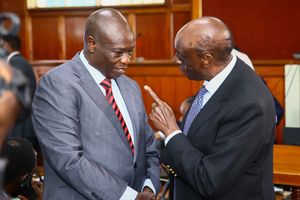What new CSs, top officials must do to succeed

President William Ruto (left) and his first batch of Cabinet nominees.
Three things are key for the incoming Cabinet secretaries and other senior government officials. First, there is need to be guided by the Pareto Principle, coined by economist Vilfredo, and the Principle of Least Effort.
In the book 80/20 Principle by Richard Koch, a foreword by Henry Ford notes that “God plays dice with the universe. But they are loaded dice. And the main objective is to find out by what rules they were loaded and how we can use them for our own ends.”
As a CS or senior government official, you have to find the rules that work. The major implication of the 80/20 principle is that for all occasions and purposes, 20 per cent of customers, products, programmes, projects and employees always produce 80 per cent of the profits, success, impact and output. Conversely, 80 per cent of the customers, products, programmes, projects and employees are responsible for only 20 per cent of the desired outputs or outcomes.
Secondly, every ministry, department and agency (MDA) has a strategic plan, prepared through thorough stakeholder engagement, to guide operations and performance for five years. These MDAs have work plans which operationalise the strategic plan for each year by providing detailed projects and activities. In addition, MDAs have performance contracts, which has six major aspects: financial stewardship; service delivery parameters; implementation of core mandate; implementation of presidential directives; implementation of affirmative action in procurement; cross cutting issues like asset management, youth internships and competence development.
These documents can provide a quick understanding of the MDA, and enable them to form opinions of what needs to be done or improved first.
Thirdly, the CS and other senior officials need to incentivise civil servants through creation of adequate feedback mechanisms. The CS will get a pool of highly trained and skilled workers who have accumulated knowledge and expertise for many years. Such expertise and knowledge cannot be obtained from advisors. Successful CS’s must work with the civil servants. The public has spent massive funds in training them, so they have wide skills and knowledgeable that will prove invaluable to the CS or other senior official.
Dr Daniel Giti





